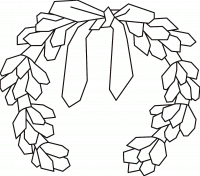Spring 2020
(Jump to Fall 2019)
Primarily for Undergraduates
ARCH 0153 The Pyramids in Context: Archaeology of Life and Religion of Death in Old Kingdom Egypt (EGYT 0500) [CRN: 26168]
Interested students must register for EGYT 0500.
No ancient world monument is more iconic than the Egyptian pyramids of Giza. This course sets out to be a comprehensive analysis of the Old Kingdom (2575-2150 BCE) pyramids and the material, historical and symbolic context that produced them. How and why were the pyramids built? What was inside them? How was everyday life in the pyramid towns? What kind of rituals were performed in their multiple chambers? This course wants to show the real face of the pyramids and the people who worked on and lived by them. Instructor: Maria Almansa Villatoro.
ARCH 0156 Architecture and Urbanism of the African Diaspora (HIAA 0770) [CRN: 24562]
Interested students must register for HIAA 0770.
This lecture course introduces the built environments in and of "Africa," from the earliest known examples to the contemporary moment. Through a consideration of texts and images, we will interrogate "Africa" as both a construct and concrete geographical entity characterized by diverse cultures, contexts, and histories. In addition to exploring the content of various architectural and urban traditions, we will approach our topic from the point of view of the theoretical paradigms that have governed the historiographical interpretation of particular periods, regions, and cultures. Readings will be arranged thematically and according to chronology and geography. Weekly one-hour section required. DPLL WRIT. TTh 1pm-2:20pm. Instructor: Itohan Osayimwese.
ARCH 0250 Intimate Stories, Imagined Landscapes [CRN: 26298] [Course Website]
Stories carry us to imaginary worlds other than our own. An arresting story engages us deeply, opening the doors to fantastic places and times. Such enthralling narratives have even shaped archaeology’s assumptions about places and the people who inhabit them -- and, in turn, archaeological discoveries have influenced ideas about real landscapes through fiction. This course explores novels and narrative fiction as a way of understanding how people and cultures imagine landscapes and these places' roles in human lives past and present. TTh 10:30am-12pm. Instructor: Darcy Hackley.
ARCH 0317 Heritage in the Metropolis: Remembering and Preserving the Urban Past [CRN: 26202] [Course Website]
Urban heritage – from archaeological sites and historic architecture to longstanding cultural practices – is increasingly threatened by the exponential growth of cities around the globe. Most critically, the complex histories and lived experiences of the diverse communities who have inhabited and shaped cities are often in danger of being erased and forgotten today. This course examines how we might remember and preserve this urban past – and the tangible sites and artifacts that attest to it – in light of the social and political dynamics of cities in the present. MWF 2pm-2:50pm. Instructor: Lauren Yapp.
ARCH 0520 Roman Archaeology and Art [CRN: 25756] [Course Website]
Anyone who has ever watched “Gladiator”, “Spartacus”, “Life of Brian”, or “Bugs Bunny: Roman Legion Hare” has some image of Rome, the Romans and their empire. This course, while exploring and assessing these influential popular preconceptions, introduces a more balanced view of Roman archaeology and art, examining not only the “eternal city” of Rome, but its vast and diverse imperial domain. MWF 1pm-1:50pm. Instructor: Candace Rice.
ARCH 0680 Water, Culture, & Power [CRN: 25940] [Course Website]
Water is the source of life. In the midst of global climate change, environmental crises over water resources, and increasingly ubiquitous political debates over water, we are beginning to recognize humans' complete dependence on water. This course investigates our long-term attachment and engagement with water from the point of view of archaeological, environmental, visual, literary, and historical sources. From flowing rivers to churning seas and from aqueducts to public fountains, we will explore the cultural and environmental aspects of water in the Near East, Mediterranean, and Europe beginning with the Last Ice Age and ending in the modern day. MWF 11am-11:50am. Instructor: Tyler Franconi.
For Undergraduates and Graduates
ARCH 1143 Experiencing the Roman Empire: Life in the Roman Provinces (CLAS 1120P) [CRN: 26310]
Interested students must register for CLAS 1120P.
This course explores the experiences of people living in the Roman Empire through archaeological and textual evidence, seeking to understand how Roman imperialism shaped the daily life of its residents, from Spain to Mesopotamia and from Scotland to Egypt. We will address themes such as imperialism, identity, globalization, and Romanization as we investigate provincial urbanism, economies, rural settlements, the military, art, and religion from a number of different case studies in order to understand how the Roman Empire both shaped and was shaped by those living within its territory. MWF 10am-10:50am. Instructor: Candace Rice.
ARCH 1214 The Viking Age (HIST 1210A) [CRN: 24666]
Interested students must register for HIST 1210A.
For two centuries, Viking marauders struck terror into the hearts of European Christians. Feared as raiders, Norsemen were also traders and explorers who maintained a network of connections that stretched from North America to Baghdad and who developed a complex civilization that was deeply concerned with power and its abuses, the role of law in society, and the corrosive power of violence. This class examines the tensions and transformations within Norse society between AD 750 and 1100 and how people living in the Viking world sought to devise solutions to the challenges that confronted them as their world expanded and changed. MWF 11am-11:50am. Instructor: Jonathan Conant.
ARCH 1425 Archaeology, Materiality, and National Imagination in Israel and Greece: A Comparative Approach [CRN: 26629] [Course Website]
Israel and Greece have had very different histories and yet in both cases their constitution as nation states is intricately linked to conceptions of antiquity and the practices of archaeology. In this course we will examine prominent figures and central projects in Greece, Palestine and Israel from the 19th to the 21st c. and ask questions such as: What were the foundational genealogical myths in each case? How important is religion and how is it interwoven with antiquity and archaeology? How does colonialism intersect with nationalism in this relationship, and what are the colonizing effects of archaeology itself? TTh 1pm-2:20pm. Instructors: Yannis Hamilakis and Raphael Greenberg.
ARCH 1487 Environmental History of East Asia (HIST 1820B) [CRN: 25661]
Interested students must register for HIST 1820B.
This is a lecture course on the environmental history of East Asia from prehistory to the present aimed at students with no background in either Asian or environmental history. Because little has been written about Korean or Vietnamese environmental history, it will mostly concern China and Japan, for which there are good textbooks. The course will also incorporate weekly primary source readings, or analysis of artifacts. TTh 2:30pm-3:50pm. Instructor: Brian Landers.
ARCH 1627 Life on the Nile: Ancient Egypt beyond the Pharaohs (EGYT 1465) [CRN: 26169]
Interested students must register for EGYT 1465.
The history of ancient Egypt is marked by the names of their great pharaohs and monumental buildings. But what about ordinary people who made up the majority of this fascinating culture, yet are not well represented in historical narratives? This course will explore what we know about the daily life of non-royal Egyptians by looking at the primary texts (in translation), art, and material culture of ancient Egypt. We will look at various categories of population, such as children, craftsmen, women, soldiers; and discuss such issues and topics as households, growing up, family, education, love, clothing, medicine, magic, and leisure. TTh 9am-10:20am. Instructor: Silvia Stubnova.
ARCH 1771 Archaeology of Death (ANTH 1623) [CRN: 25451]
Interested students must register for ANTH 1623.
Examines death, burial, and memorials using comparative archaeological evidence from prehistory and historical periods. The course asks: What insight does burial give us about the human condition? How do human remains illuminate the lives of people in the past? What can mortuary artifacts tell us about personal identities and social relations? What do gravestones and monuments reveal about beliefs and emotions? Current cultural and legal challenges to the excavation and study of the dead are also considered. MWF 12pm-12:50pm. Instructor: Patricia Rubertone.
ARCH 1773 Bioarchaeology and Forensic Anthropology (ANTH 1750) [CRN: 24647]
Interested students must register for ANTH 1750.
Bioarchaeology and forensic anthropology have common methodological roots (human osteology) but are oriented to answer very different questions. Both are grounded in the anthropological sub-disciplines of biological anthropology and archaeology. The focus in bioarchaeology is advancing our understanding of the human experience in the past. Bioarchaeologists study a range of topics including health, violence, migration, and embodiment. Forensic anthropology is a form of applied anthropology that is employed to document and interpret human remains in medico-legal contexts. The course will survey both fields while instructing in the methodologies and approaches of each. The course complements The Human Skeleton (ANTH 1720). Prerequisites: ANTH 0500 or 1720. TTh 9am-10:20am. Instructor: Andrew Scherer.
ARCH 1778 Animal, Vegetable, Mineral: Environmental Histories of Non-Human Actors (HIST 1976C) [CRN: 26154]
Interested students must register for HIST 1976C.
More than other sub-fields of history, environmental history approaches non-human actors as agents in their own right. This forces a radical reconceptualization of the nature of the subject. What happens to our understanding of the past (and the stories we tell about the past) if we posit that mountains think, mosquitos speak, and dogs dream? Drawing on Science and Technology Studies, Thing Theory, and Animal Studies, this course examines such questions by decentering the human and elevating non-human actors within narratives of interactive networks. Short written assignments build on each other to culminate in a research project in environmental history. Th 4pm-6:30pm. Instructor: Nancy Jacobs.
ARCH 1792 The Archaeology of Slavery [CRN: 26626] [Course Website]
No one would question that slavery leaves invisible and painful marks on all individuals and societies touched by it. But slavery leaves behind many physical, recoverable traces as well: plantations, slave forts, slaving wrecks, burial grounds. From such evidence, this course will explore four centuries of slavery in the Atlantic world, asking not only about how people coped in the past, but about the legacy of slavery in our world today. TTh 10:30am-11:50am. Instructor: Rui Gomes Coelho.
ARCH 1796 Patterns of Migrations / People and Objects (COLT 1440W) [CRN: 25833]
Interested students must register for COLT 1440W.
This seminar studies and compares two trajectories of migration, which are thought as unrelated and studied separately by scholars from different disciplines in the humanities and social sciences. The first) migration is that of objects that generated professional care, scrupulous documentation, generous hospitality in museums, archives, and displays; the second is migration of people who do not have or cannot obtain the documents without which they are banned from access to most kinds of care and hospitality, and from rebuilding their homes and worlds. Th 4pm-6:30pm. Instructor: Ariella Azoulay.
ARCH 1805 The Archaeology of Us: A Material Approach to the Contemporary World [CRN: 26628] [Course Website]
Archaeology is traditionally seen as exclusively concerned with the past. However, the budding field of contemporary archaeology considers that our own material culture and built environment are equally important to examine archaeologically. This course explores materially-oriented approaches to analyzing our contemporary world, from the study of garbage to the destruction of heritage sites by ISIS. Course material will examine geopolitical crises including migration, militarism, inequality, and environmental devastation. Students will engage with local communities and the Providence area. TTh 2:30pm-3:50pm. Instructor: Rui Gomes Coelho.
ARCH 1822 Anthropology of Place (ANTH 1910B) [CRN: 25480]
Interested students must register for ANTH 1910B.
The anthropology of place serves as a unifying theme for the seminar by bridging anthropology’s subdisciplines and articulating with other fields of knowledge. Through readings and discussion, students will explore how place permeates people’s everyday lives and their engagement with the world, and is implicit in the meanings they attach to specific locales, their struggles over them, and the longings they express for them in rapidly changing and reconfigured landscapes. M 3pm-5:30pm. Instructor: Patricia Rubertone.
ARCH 1867 Pastoralism and Power: Lush Lives of Arid Landscapes [CRN: 26732] [Course Website]
Deserts are often viewed as harsh, unwelcoming landscapes. However, human activity flourishes on these arid margins of civilization. Beginning with the physical landscape – the geology, geography, and hydrography – this class will then trace its influence on deserts’ social and political landscapes: communities, kinship and tribes, pastoral nomadism, trade, and territorial power struggles. Through case studies from the Negev, Sinai, and Arabian Deserts, we will explore how archaeology and archaeological science inform us about desert people, their world views and ideologies, and their strategies for thriving in arid landscapes. TTh 2:30pm-3:50pm. Instructor: Zachary Dunseth.
Primarily for Graduates
ARCH 2041 Mesoamerican Archaeology and Ethnohistory (ANTH 2520) [CRN: 25458]
Interested students must register for ANTH 2520.
Seminar focusing on current issues in the archaeology and history of Mesoamerica, including Mexico and Northern Central America. Draws on rich resources at Brown, including the John Carter Brown Library. Th 4pm-6:30pm. Instructor: Stephen Houston.
ARCH 2101 Material Matters (ANTH 2515) [CRN: 25859]
Interested students must register for ANTH 2515.
In the past decade there has been a growing interest in the study of material culture as an explicitly interdisciplinary endeavor involving the fields of anthropology, archaeology, art history, literary theory, museum studies, and philosophy, among many others. These perspectives exhibit a range of approaches to interrogating how people make things, how things make people, how objects mediate social relationships, and how inanimate objects can be argued as having a form of agency. This graduate seminar is designed to encourage reflection upon material culture and its influence in shaping our lives. F 9:30am-12pm. Instructor: Robert Preucel.
ARCH 2105 Ceramic Analysis for Archaeology [CRN: 25976] [Course Website]
The analysis and the interpretation of ceramic remains allow archaeologists to accomplish varied ends: establish a time scale, document interconnections between different areas, and suggest what activities were carried out at particular sites. The techniques and theories used to bridge the gap between the recovery of ceramics and their interpretation within anthropological contexts are the focus of this seminar. W 3pm-5:30pm. Instructor: Peter van Dommelen.
ARCH 2184 Material Culture and the Bodily Senses: Past and Present [CRN: 25991] [Course Website]
How do the senses shape our experience? How many senses are there? How do ancient and modern art and material culture relate to bodily senses? What is material and sensorial memory, and how does it structure time and temporality? Using media and objects, including archaeological and ethnographic collections at Brown and beyond, this course will study how a sensorial perspective on materiality can reshape and reinvigorate research dealing with past and present material culture. Furthermore, we will explore how sensoriality and affectivity can decenter the dominant western modernist canon of the autonomous individual. Th 4pm-6:30pm. Instructor: Yannis Hamilakis.
ARCH 2552 Museums in Their Communities (AMCV 2220D) [CRN: 26210]
Interested students must register for AMCV 2220D.
This seminar examines in detail the internal workings of museums (of anthropology, art, history, science, etc.) and their place in their communities. Accessions, collections management, conservations, education, exhibition, marketing, research, and museum management are among the topics discussed. Open to graduate students only. W 1:10pm-4:10pm. Instructor: Steven Lubar.
ARCH 2555 Museum Interpretation Practices (AMST 2697) [CRN: 26396]
Interested students must register for AMST 2697.
This course examines current interpretive practices and offers students the opportunity to participate in creating gallery interpretation for the museum context. Questions of material and form; models of attention and perception, the relationship between language and vision; the role of description in interpretation; and what constitutes learning through visual experience will be considered. Throughout the semester students will develop their interpretive practice through a series of workshops, exercises, site visits, and critical discussions. Enrollment limited to 15. F 10am-12:30pm.
ARCH 2740 Social Life in Ancient Egypt [CRN: 25941] [Course Website]
This course will draw upon recent discussions in anthropology and sociology that explore issues of identity by examining hierarchies of difference - age, sex, class, ethnicity. We will focus on linking theory with data and discussing modern and ancient categories of identity. Taking the lifecycle as its structure, the course covers conception to burial, drawing on a range of data sources, such as material culture, iconography, textual data and human remains. The very rich material past of of ancient Egypt provides an excellent framework from within which to consider how identity and social distinctions were constituted in the past. M 3pm-5:30pm. Instructor: Laurel Bestock.
Fall 2019
(Jump to Spring 2020)
Primarily for Undergraduates
ARCH 0100 Field Archaeology in the Ancient World [CRN: 17412] [Course Website]
Always wanted to be Indiana Jones? This course, focusing on the Mediterranean world and its neighbors in antiquity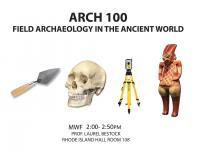 , interprets field archaeology in its broadest sense. In addition to exploring “how to do” archaeology – the techniques of locating, retrieving and analyzing ancient remains – we will consider how the nature of these methodologies affects our understanding of the past. MWF 2pm-2:50pm. Instructor: Laurel Bestock.
, interprets field archaeology in its broadest sense. In addition to exploring “how to do” archaeology – the techniques of locating, retrieving and analyzing ancient remains – we will consider how the nature of these methodologies affects our understanding of the past. MWF 2pm-2:50pm. Instructor: Laurel Bestock.
ARCH 0303 tiny: Miniature Might and Meaning [CRN: 17235] [Course Website]
Egyptian pyramids, Roman aqueducts, Easter Island heads—colossal artifacts are immediately recognizable as embodiments of power; the diminutive—though less theorized among archaeologists, anthropologists, and art historians—is just as potent and alluring. Even across vast stretches of space and time, tiny things enchant and incite wonder. A microscopic Bible, a Renaissance micro-mosaic, a sculpture of hell complete with sinners carved out of a human tooth. This course is a cross-cultural exploration of the power of the miniature, the undersized, the teeny-weeny. TTh 10:30am-11:50am. Instructor: Felipe Rojas.
ARCH 0351 The Cradle of Civilization? An Introduction to the Ancient Near East [CRN: 15594]
Interested students must register for ASYR 0800.
This course explores the cultures of ancient Mesopotamia and the Near East (present-day Iraq, Syria, Turkey, and Iran) from prehistory until the end of the first millennium BC. We will investigate the rich history and archaeology of this region through literary and historical texts (in translation) and archaeological evidence, including visual culture and architecture. Central to our discussion will be questions about how and why scholars study the Middle East in this early period. Topics include: early complex societies, state formation, the origins and development of writing, ancient empires, religion, culture and ethnicity, trade, diplomacy, warfare, agriculture, and craft production. WRIT. TTh 2:30pm-3:50pm. Instructor: Shiyanthi Thavapalan.
ARCH 0407 Hadrian's Wall: Soldiers and Civilians on Rome's Northern Frontier [CRN: 17126] [Course Website]
Explore the archaeology of one of Great Britain’s grandest monuments, Hadrian’s Wall, 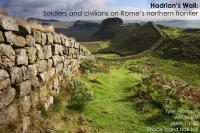 and follow its path through the history and archaeology of Roman Britain. Using the fortification as both inspiration and guide, students will learn about the life on Rome’s northern frontier, from Rome’s first occupation in the Iron Age to Roman withdrawal centuries later. The wall’s symbolic and real impact will illuminate the tangible ways archaeology can teach us about religion, race, the military, politics, art, architecture, and the everyday lives of people in one of Rome's most distant provinces. MWF 1pm-1:50pm. Instructor: Tyler Franconi.
and follow its path through the history and archaeology of Roman Britain. Using the fortification as both inspiration and guide, students will learn about the life on Rome’s northern frontier, from Rome’s first occupation in the Iron Age to Roman withdrawal centuries later. The wall’s symbolic and real impact will illuminate the tangible ways archaeology can teach us about religion, race, the military, politics, art, architecture, and the everyday lives of people in one of Rome's most distant provinces. MWF 1pm-1:50pm. Instructor: Tyler Franconi.
ARCH 0446 War and Peace in the Hebrew Bible and its Environment (JUDS 0670) [CRN: 16372]
Interested students must register for JUDS 0670.
An examination of the role of war and peace in the Hebrew Bible and in texts and art of ancient Israel’s neighbors. Topics include divine beings, war and peace-making; peace treaties; explaining defeat and victory; ideologies of warfare; the treatment of prisoners, corpses and captured bones; the warrior as masculine ideal; civil war and coups; treaty obligations; ritual dimensions of war and peace (e.g., mourning, animal sacrifice, child sacrifice, divination, memorializing war); visual representations of war as propaganda; the idea of a future, eschatological war between the forces of good and the forces of evil. No prerequisites. TTh 9am-10:20am. Instructor: Saul Olyan.
ARCH 0530 Hannibal ad Portas! Fact and Fiction on Carthage and the Punic World [CRN: 17122] [Course Website]
"Hannibal stands at the gates": Roman parents would terrify their children with these words. 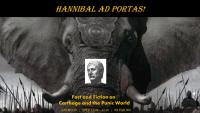 And many others have been haunted by Hannibal Barca: the Carthaginian general still fascinates the European imagination, not least his epic trek over the Alps with three dozen elephants. This course explores fact and fiction about Hannibal and his world, holding up historical and mythical records against hard archaeological evidence. MWF 12pm-12:50pm. Instructor: Peter van Dommelen.
And many others have been haunted by Hannibal Barca: the Carthaginian general still fascinates the European imagination, not least his epic trek over the Alps with three dozen elephants. This course explores fact and fiction about Hannibal and his world, holding up historical and mythical records against hard archaeological evidence. MWF 12pm-12:50pm. Instructor: Peter van Dommelen.
ARCH 0770 Archaeology of Eating and Drinking [CRN: 17121] [Course Website]
Everybody eats -- but patterns of eating and drinking vary dramatically from culture to culture.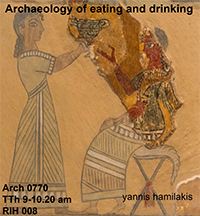 This course will examine the social roles and meanings of eating and drinking from prehistory to the present, using case studies from the Mediterranean and other parts of the world. How are identity, gender, and power negotiated through food and drink? What are the roles of the body, the senses, and memory? What does a history of humanity look like from the point of view of the consuming body? FYS. TTh 9am-10:20am. Instructor: Yannis Hamilakis.
This course will examine the social roles and meanings of eating and drinking from prehistory to the present, using case studies from the Mediterranean and other parts of the world. How are identity, gender, and power negotiated through food and drink? What are the roles of the body, the senses, and memory? What does a history of humanity look like from the point of view of the consuming body? FYS. TTh 9am-10:20am. Instructor: Yannis Hamilakis.
ARCH 0801 Alexander the Great and the Alexander Tradition (CLAS 0810A) [CRN: 16945] [Course Website]
Interested students must register for CLAS 0810A.
This course focuses on a single historical figure, Alexander the Great, using him as a point of departure 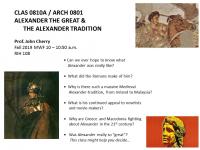 for exploring a wide range of problems and approaches that typify the field of Classical Studies. How knowledge of Alexander has been used and abused provides a fascinating case study in the formation and continuous reinterpretation of the western Classical tradition. MWF 10am-10:50am. Instructor: John Cherry.
for exploring a wide range of problems and approaches that typify the field of Classical Studies. How knowledge of Alexander has been used and abused provides a fascinating case study in the formation and continuous reinterpretation of the western Classical tradition. MWF 10am-10:50am. Instructor: John Cherry.
For Undergraduates and Graduates
ARCH 1056 Indigenous Archaeologies (ANTH 1125) [CRN: 16817]
Interested students must register for ANTH 1125.
This course is an introduction to Indigenous archaeology, sometimes defined as archaeology "by, for and with Indigenous peoples." These approaches combine the study of the past with contemporary social justice concerns. However, they are more than this. In addition to seeking to make archaeology more inclusive of and responsible to Indigenous peoples, they seek to contribute a more accurate understanding of archaeological record. They thus do not reject science, but attempt to broaden it through a consideration of Indigenous epistemologies. This course covers topics as the history of anthropological archaeology, Indigenous knowledge and science, decolonizing methodologies, representational practices and NAGPRA. TTh 10:30am-11:50am. Instructor: Robert Preucel.
ARCH 1128 The Long Fall of the Roman Empire (CLAS 1205) [CRN: 16946]
Interested students must register for CLAS 1205.
Once thought of as the "Dark Ages," this period of western European history should instead be seen as a fascinating time in which late Roman culture fused with that of the Germanic tribes, a mixture tempered by a new religion, Christianity. Issues of particular concern include the symbolic construction of political authority, the role of religion, the nature of social loyalties, and gender roles. TTh 10:30am-11:50am. Instructor: Jonathan Conant.
ARCH 1162 Anthropology in/of the Museum (ANTH 1901) [CRN: 17257]
Interested students must register for ANTH 1901.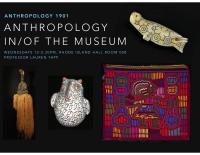
This course will provide an introduction to the history, purposes, transformations, and internal workings of museums from an anthropological perspective. Students will learn about museums that focus on natural and cultural history related to anthropological studies of archaeology, human evolution, and world ethnography. It will cover the relevance of anthropological training to careers in the museum field, as well as the importance of conducting anthropological investigations in the museum environment. Enrollment limited to 20. W 12pm-2:30pm. Instructor: Lauren Yapp.
ARCH 1167 Museum Histories (AMCV 1903I) [CRN: 16476]
Interested students must register for AMCV 1903I.
Museums collect and display art and artifacts not only to preserve culture heritage, but also to educate, engage, and entertain. This course examines the history of museums– of art, history, anthropology, natural history, science and technology– to understand their changing goals and their changing place in American society. It also considers the changes within museums, in the work of curation, conservation, education, and social engagement. Students will read museum history and theory, engage with museum archives and other primary sources, and produce a research paper or a digital or public project. TTh 10:30am-11:50am. Instructor: Steven Lubar.
ARCH 1282 Mediterranean Culture Wars: Archaic Greek History, c. 1200 to 479 BC (CLAS 1210) [CRN: 16957]
Interested students must register for CLAS 1210.
From the end of the Bronze Age to the end of the Persian Wars is a period of considerable change in the Mediterranean and beyond. The Greek polis challenges the powers of the ancient Near East. Over seven centuries we meet Greek writing, Homeric epic, and the first historian (Herodotus). But the Greek world lay on the edges of the Ancient Near East and this course tries to offer a more balanced approach than the typically Hellenocentric perspective of the standard textbooks. CLAS 1210 addresses political, social and economic history. Literary, epigraphical and archaeological cultures provide the evidence. WRIT. MWF 9am-9:50am. Instructor: Graham Oliver.
ARCH 1448 Digging for the Bible: Science, Religion, and Politics (JUDS 1974) [CRN: 15909]
Interested students must register for JUDS 1974.
Archaeological exploration in the “Holy Land” began in the mid-19th century and was motivated by the quest to discover the biblical sites. This region features among the most important visual and material remains connected to the origins of Judaism, Christianity, and Islam. This seminar will explore the relevant material remains from the Bronze Age through the end of the Ottoman period, and examine how these finds and their interpretations were shaped by religious and political motivations from the earliest endeavors to the present day. T 4pm-6:30pm. Instructor: Katharina Galor.
ARCH 1543 Decolonizing Classical Antiquity: White Nationalism, Colonialism, and Ancient Material Heritage (MGRK 1220) [CRN: 17446] [Course Website]
Interested students must register for MGRK 1220.
Why do the material remnants of classical antiquity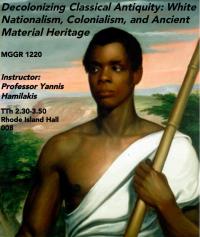 still attract public attention and exercise symbolic power? Why have such monuments been "used" by authorities and diverse social groups in the service of often totalitarian agendas? What are the cases where these monuments operate as weapons for resistance? How has colonial, racial, and national modernity shaped the way we understand and experience the materiality of the classical? Finally, how can we decolonize classical antiquity? We will use a diversity of global case studies, including modern Greece, Europe, and the USA, and a variety of sources, from ethnographically derived performances to digital culture. TTh 2:30pm-3:50pm. Instructor: Yannis Hamilakis.
still attract public attention and exercise symbolic power? Why have such monuments been "used" by authorities and diverse social groups in the service of often totalitarian agendas? What are the cases where these monuments operate as weapons for resistance? How has colonial, racial, and national modernity shaped the way we understand and experience the materiality of the classical? Finally, how can we decolonize classical antiquity? We will use a diversity of global case studies, including modern Greece, Europe, and the USA, and a variety of sources, from ethnographically derived performances to digital culture. TTh 2:30pm-3:50pm. Instructor: Yannis Hamilakis.
ARCH 1621 History of Egypt I (EGYT 1430) [CRN: 15642] [Course Website]
Interested students must register for EGYT 1430.
A survey of the history and society of ancient Egypt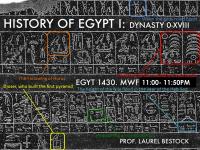 from prehistoric times to the end of the Eighteenth Dynasty (ca. 5000-1300 BC). Readings include translations from the original documents that serve as primary sources for the reconstruction of ancient Egyptian history. WRIT. MWF 11am-11:50am. Instructor: Laurel Bestock.
from prehistoric times to the end of the Eighteenth Dynasty (ca. 5000-1300 BC). Readings include translations from the original documents that serve as primary sources for the reconstruction of ancient Egyptian history. WRIT. MWF 11am-11:50am. Instructor: Laurel Bestock.
ARCH 1772 The Human Skeleton (ANTH 1720) [CRN: 16104]
Interested students must register for ANTH 1720.
More than simply a tissue within our bodies, the human skeleton is gateway into narratives of the past--from the evolution of our species to the biography of individual past lives. Through lecture and hands-on laboratory, students will learn the complete anatomy of the human skeleton, with an emphasis on the human skeleton in functional and evolutionary perspective. We will also explore forensic and bioarchaeological approaches to the skeleton. By the course conclusion, students will be able to conduct basic skeletal analysis and will be prepared for more advanced studies of the skeleton from medical, forensic, archaeological, and evolutionary perspectives. Enrollment limited to 20. Not open to first year students. Instructor permission required. TTh 9am-10:20am. Instructor: Andrew Scherer.
ARCH 1792 The Archaeology of Slavery [CRN: 16118] [Course Website]
No one would question that slavery leaves invisible and painful marks on all individuals and societies touched by it. 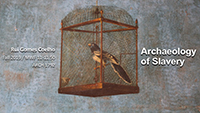 But slavery leaves behind many physical, recoverable traces as well: plantations, slave forts, slaving wrecks, burial grounds. From such evidence, this course will explore four centuries of slavery in the Atlantic world, asking not only about how people coped in the past, but about the legacy of slavery in our world today. MWF 11am-11:50am. Instructor: Rui Gomes Coelho.
But slavery leaves behind many physical, recoverable traces as well: plantations, slave forts, slaving wrecks, burial grounds. From such evidence, this course will explore four centuries of slavery in the Atlantic world, asking not only about how people coped in the past, but about the legacy of slavery in our world today. MWF 11am-11:50am. Instructor: Rui Gomes Coelho.
ARCH 1852 Material Culture Practicum (ANTH 1621) [CRN: 16822]
Interested students must register for ANTH 1621.
Combines theory with hands-on study of material culture in historical archaeology. Students gain skills and experience in identifying, dating, recording, analyzing, and interpreting artifacts and conduct individual or team research projects. Enrollment limited to 15. M 3pm-5:30pm. Instructor: Patricia Rubertone.
ARCH 1870 Environmental Archaeology [CRN: 17127] [Course Website]
How has climate change affected the development of human society? How have people changed or destroyed their environments in the past? 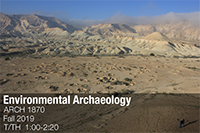 What does "sustainability" mean over the long term? Environmental archaeology is the study of these questions and more through the use of scientific techniques to analyze soils, plants, and animal remains from ancient archaeological contexts. A combination of class and hands-on teaching will introduce these methods and how they allow us to interpret human-environmental interactions in the past. TTh 1pm-2:20pm. Instructor: Zachary Dunseth.
What does "sustainability" mean over the long term? Environmental archaeology is the study of these questions and more through the use of scientific techniques to analyze soils, plants, and animal remains from ancient archaeological contexts. A combination of class and hands-on teaching will introduce these methods and how they allow us to interpret human-environmental interactions in the past. TTh 1pm-2:20pm. Instructor: Zachary Dunseth.
ARCH 1873 Imperialism and Environmental Change (HIST 1976I) [CRN: 17439]
Interested students must register for HIST 1976I.
Empires conquer and control territory to enrich their ruling elites, often transforming the environments of these regions to make them more productive and profitable. This course will examine how empires have reorganized the landscapes of the regions they conquered from the ancient empires of Rome and China to the modern overseas empires of Europe and Japan and the informal American empire. W 3pm-5:30pm. Instructor: Brian Lander.
ARCH 1877 The Pictured Text (ANTH 1830 and HIAA 1212) [CRN: 17046 and CRN: 16805]
Interested students must register for ANTH 1830 or HIAA 1212.
Writing makes language visible, and thus concerns images. Language also delimits the legibility of imagery. Turning words into images and images into words occurs at great speed around us. This course explores the relation of text and image across world traditions—Chinese, Mayan, Egyptian, Islamic, Greco-Roman, and others, extending up to the present. Topics include: calligraphy, context, scribal practice, the form and shape of writing, including typography, hidden or pseudo-writing, graffiti, and contemporary art. W 3pm-5:30pm. Instructors: Jeffrey Moser and Stephen Houston.
ARCH 1879 A World in Color: Seeing and Feeling Colors in the Ancient World [CRN: 17799] [Course Website]
Historical facts are often described as black and white: gritty, unfiltered reality. 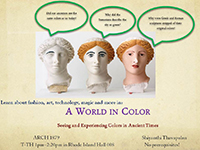 But to picture the ancient world in all its colors is to see a fuller picture of the beauty, luxury, meaning, and cultural struggles of the past. Adding color is in itself a controversial act: scholars have received death threats for asserting that marble statues were not pristine white in antiquity. This class investigates the meaning of color as a culturally mediated, embedded, and charged phenomenon, using not just art historical approaches, but contemporary critical theory, material culture studies, linguistics, and economics. TTh 1pm-2:20pm. Instructor: Shiyanthi Thavapalan.
But to picture the ancient world in all its colors is to see a fuller picture of the beauty, luxury, meaning, and cultural struggles of the past. Adding color is in itself a controversial act: scholars have received death threats for asserting that marble statues were not pristine white in antiquity. This class investigates the meaning of color as a culturally mediated, embedded, and charged phenomenon, using not just art historical approaches, but contemporary critical theory, material culture studies, linguistics, and economics. TTh 1pm-2:20pm. Instructor: Shiyanthi Thavapalan.
ARCH 1882 Introduction to Geographic Information Systems for Environmental Applications (GEOL 1320) [CRN: 17367 or 17368]
Interested students must register for GEOL 1320.
Introduction to the concepts of geospatial analysis and digital mapping. The principles of spatial data structures, coordinate systems, and database design are covered. Related work in image databases also discussed. Extensive hands-on training in ESRI-based geographic information system software will be provided. Focal point of class is the completion of student-selected research project employing GIS methods.
ARCH 1884 Remote Sensing of Earth and Planetary Surfaces (GEOL 1710) [CRN: 15372]
Interested students must register for GEOL 1710.
Geologic applications of remotely sensed information derived from interaction of electromagnetic radiation (X-ray, gamma-ray, visible, near-IR, mid-IR, radar) with geologic materials. Applications emphasize remote geochemical analyses for both terrestrial and extraterrestrial environments. Several spectroscopy and image processing labs. GEOL 0230, PHYS 0060, or equivalent recommended. TTh 1pm-2:20pm. Instructor: Ralph Milliken.
ARCH 1890 Lost Languages [CRN: 17798] [Course Website]
Humans make many marks, but it is writing that records, in tangible form, the sounds and meanings of language. Creating scripts is momentous; writing facilitates complex society and is a crucial means of cultural expression. This course addresses the nature of writing in past times. Topics include: the technology of script; its precursors and parallel notations; its emergence, use, and "death"; its change over time, especially in moments of cultural contact and colonialism; writing as a physical object or thing; code-breaking and decipherment, including scripts not yet deciphered; and the nature of non-writing or pseudo- or crypto-scripts. TTh 2:30pm-3:50pm. Instructor: Felipe Rojas.
ARCH 1900 The Archaeology of College Hill [CRN: 17129] [Course Website]
A training class in field and laboratory techniques. Topics include the nature of field archaeology, 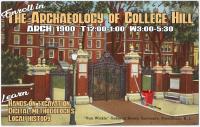 excavation and survey methodologies, archaeological ethics, computer technologies (such as GIS), and site and artifact analysis and conservation. Students will act as practicing archaeologists through the investigation of local historical and archaeological sites in the College Hill area (e.g. the First Baptist Church of America and the John Brown House). W 3pm-5:30pm. Instructor: Alex Marko.
excavation and survey methodologies, archaeological ethics, computer technologies (such as GIS), and site and artifact analysis and conservation. Students will act as practicing archaeologists through the investigation of local historical and archaeological sites in the College Hill area (e.g. the First Baptist Church of America and the John Brown House). W 3pm-5:30pm. Instructor: Alex Marko.
Primarily for Graduates
ARCH 2006 Principles of Archaeology (ANTH 2501) [CRN: 16834]
Interested students must register for ANTH 2501.
Examines theoretical and methodological issues in anthropological archaeology. Attention is given to past concerns, current debates, and future directions of archaeology in the social sciences. T 9am-11:30am. Instructor: Andrew Scherer.
ARCH 2112 Roman Epigraphy (LATN 2120A) [CRN: 16934]
Interested students must register for LATN 2120A.
A practical introduction to the study of Latin inscriptions, with emphasis on the reading, editing, and interpretation of texts on stone. Class time will be divided between discussion of various categories of texts in the light of the 'epigraphic habit', literacy, and the sociology of reading in antiquity and hands-on experience with editing inscriptions on stone. M 3pm-5:30pm. Instructor: John Bodel.
ARCH 2250 Island Archaeology in the Mediterranean [CRN: 17128] [Course Website]
The Mediterranean is a world of islands, par excellence, and the island cultures that have developed there over the millennia have great archaeological distinctiveness. This seminar will consider the concept of insularity itself, in cross-cultural archeological, anthropological, and historical perspective. We will then turn to the rich, specifically Mediterranean literature on island archaeology (exploring issues of colonization, settlement, interaction). W 3pm-5:30pm. Instructor: John Cherry.
ARCH 2412 Space, Power, and Politics (ANTH 2590) [CRN: 17475]
Interested students must register for ANTH 2590.
This course critically examines the politics of space and landscape from an interdisciplinary perspective. After reading key texts in political philosophy and cultural geography, we explore themes in recent scholarship including the spatial production of sovereignty, capital, and political subjectivity and the evolving role of digital cartography in public culture and politics. Case studies are drawn from archaeology, art history, ethnography, cultural geography, and history. M 3pm-5:30pm. Instructor: Parker VanValkenburgh
ARCH 2413 Decolonizing Space and Visual Cultures (HIAA 2285) [CRN: 17243]
Interested students must register for HIAA 2285.
This seminar explores scholarly debates about decolonizing space and visual cultures in post-colonial sub-Saharan Africa and Europe. We will discuss these recent initiatives in the context of previous efforts and of a focused study of African-European colonial histories. Themes include: the violent acquisition of African artifacts; the inscription and erasure of mythologies of colonial conquest and heroism in the iconography of colonial monuments; the semiotic transformation of colonial architecture through nationalization; colonial toponymy and land reform. Th 4pm-6:30pm. Instructor: Itohan Osayimwese.
ARCH 2553 Introduction to Public Humanities (AMST 2650) [CRN: 15773]
Interested students must register for AMST 2650.
This class, a foundational course for the MA in Public Humanities with preference given to American Studies graduate students, will address the theoretical bases of the public humanities, including topics of history and memory, museums and memorials, the roles of expertise and experience, community cultural development, and material culture. Enrollment limited to 20 graduate students. W 3pm-5:30pm. Instructor: Monica Martinez.
ARCH 2554 Decolonizing Public Humanities: Intersectional Approaches to Curatorial Work + Community Organizing (AMST 2694) [CRN: 16118]
Interested students must register for AMST 2694.
This course will decenter experiences and cultural expectations attendant to whiteness, cis-maleness, able-bodiedness, heterosexuality, and middle/upper-classness in the public humanities,and thereby explore the contemporary problems and possibilities of intersectional approaches in the field. What do contemporary paradigms of “diversity,” “public engagement,” and “cultural organizing” have to teach us about effective and ethical public humanities approaches? Do different, multiply marginalized communities of affinity practice entirely different public humanities? How are cultural interventions changing to accommodate the demands of an increasingly segmented public sphere? TTh 6:40pm-8pm.
ARCH 2625 Broken Pots to GDP: Economies of the Roman World 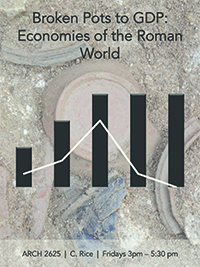 [CRN: 17343] [Course Website]
[CRN: 17343] [Course Website]
Rome developed one of the most complex and extensive economic systems of the pre-industrial era, and debates on the nature and scale of this system have intensified in recent years due to an influx of archaeological data. This course examines a diverse range of material from across the Roman world as we explore the impact that recent archaeological discoveries and new methodological developments have had on our understanding of the Roman economy. F 3pm-5:30pm. Instructor: Candace Rice.
Additional Resources
You may also visit Courses@Brown listings for up-to-date information on courses and room assignments. Check under: Area of Study: "Archaeology and the Ancient World”
For a listing of all courses ever taught in Archaeology and the Ancient World (or in Old World Archaeology, its predecessor), please visit the "All Courses" page on this website. To browse the web pages and Canvas sites -- including syllabi -- for most ARCH courses, please see our "Course Websites" page.

